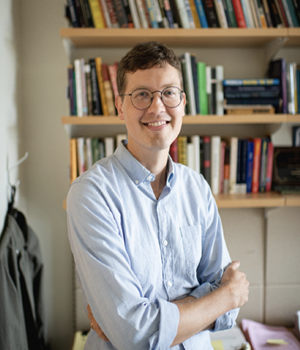
Nathan Wilmers
he/him
Sloan School of Management
Cultivating confidence, craft, and care
Nathan Wilmers is the Sarofim Family Career Development Associate Professor of Work and Organizations at MIT Sloan. His research spans wage and earnings inequality, economic sociology, and the sociology of labor. He is also affiliated with the Institute for Work and Employment Research, and the Economic Sociology program at Sloan. Wilmers researches wage and earnings inequality, economic sociology, and the sociology of labor, bringing insights from economic sociology to the study of labor markets and the wage structure.
Within this impressive range of research and accolades, what truly sets Professor Wilmers apart is the meaningful support he provides to his students. “Nate played an important role in helping me overcome obstacles in my academic journey,” one nominator shared.
Remarkable mentor
A remarkable mentor, Wilmers is known for guiding his students through different projects while also teaching them more broadly about the system of academia. As one nominator illustrates, “he… helped me learn the ‘tacit’ knowledge to understand how to write a paper,” while also emphasizing the learning process of the PhD as a whole and never reprimanding any mistakes along the way.
Students share that Wilmers “reassures us that making mistakes is a natural part of the learning process and encourages us to continuously check, identify, and rectify them.” He welcomes all questions without judgment, and generously invests his time and patience in teaching students.
Wilmers is a strong advocate for his students, both academically and personally. He emphasizes the importance of learning, growth, and practical experience, rather than solely focusing on scholarly achievements and goals. Students feel this care reflected back, describing “an environment that maximizes learning opportunities and fosters the development of skills,” allowing them to truly collaborate rather than simply aim for the ‘right’ answers.
In addition to his role in the classroom and lab, Wilmers also provides informal guidance to advisees, imparting valuable knowledge about the academic system, emphasizing the significance of networking, and sharing insider information.
“Nate’s down-to-earth nature is evident in his accessibility to students,” expressed one nominator, who shared that “sometimes we can freely approach his office without an appointment and receive valuable advice on both work-related and personal matters.” Moreover, Wilmers prioritizes his advisees’ career advancement, dedicating a substantial amount of time to providing guidance on thesis projects, and even encouraging students to take a lead in publishing research.
“I feel that [my time working with Wilmers] has taught me what positive and supportive mentoring relationships look like and given me a guide of how to work with scholars and students in the future,” one advisee shared.
Informal guidance
Wilmers recognizes that there is no ‘one size fits all’ approach to higher education. Students need different kinds of support– some need help finding ideas, others with execution or writing. The key, according to him, is “assessing a student’s strengths and supporting them where they need it.”
His expertise and willingness to share these insights have proven invaluable in helping his mentees navigate the intricacies of academia and develop essential skills for their academic and professional growth. A nominator mentioned that “he has been incredibly generous in offering us a wealth of practical advice on various aspects,” specifically citing the topics of navigating the academic job market, developing a robust research profile, publishing work successfully, securing access to datasets, providing thoughtful peer reviews, and balancing several research projects at once.
True mentorship often lies in the patient, careful transmission of craft– the behind-the-scenes work that forms the backbone of rigorous research. “I care about the details,” says Wilmers, reflecting a philosophy shaped by his own graduate advisors, who instilled in him a deep respect for the less glamorous but essential elements of scholarly work: data cleaning, thoughtful analysis, and careful interpretation. These technical and analytical skills are where real learning happens, he believes.
By modeling this approach with his own students, Wilmers creates a culture where precision and discipline are valued just as much as innovation. His mentorship is grounded in the belief that becoming a good researcher requires not just vision, but also an intimate understanding of process– of how ideas are sharpened through methodical practice, and how impact comes from doing the small things well. His thoughtful, detail-oriented mentorship leaves a lasting impression on his students.
A nominator acclaimed, “Nate’s strong enthusiasm for my research, coupled with his expressed confidence and affirmation of its value, served as a significant source of motivation for me to persistently pursue my ideas.”
